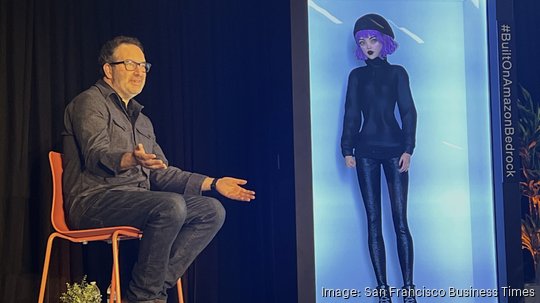
Amazon Web Services launched a new generative AI hub in San Francisco this week, aptly named the "Gen AI Loft," based in its office space located in downtown San Francisco.
The cloud storage and services giant kicked things off with a publicity stunt involving four-wheeled robots roaming around a plaza at 525 Market Street, as I reported on Wednesday.
AWS then held an event Wednesday evening featuring entrepreneurs who are utilizing generative AI to create art and support artists.
Chloe Ryan, the CEO and founder of Montreal-based Acrylic Robotics, presented her vision for empowering artists with AI-powered robots that can make "real" and tactile reproductions of their paintings, with the artist's consent and compensation, of course. A robotic arm painted autonomously onstage while Ryan spoke.
U.S.-based visual artist Claire Silver remotely appeared via an unusual livestream. Rather than Zooming into the event from an undisclosed remote location, Silver appeared via an avatar that was projected as a life-sized hologram.
Silver talked about how using generative AI-powered tools has helped her move through feelings of isolation due to illness, tap into childhood memories and explore existential themes around humanity and art itself.
"In 2018, I discovered AI and I found it was rather like fluid painting. There was a vision and a lack of control, then surprising results both frustrating and delightful, and choice. Again, there was choice. Bringing purpose to chaos through narrative curation not by skill but by taste. I began to wonder what we might value in ourselves and others if skills were no longer a barrier. What might we judge ourselves by then? I wondered what a future where AI had solved for illnesses like mine could look like," Silver said.
Watch Silver's full talk below.
For people like Silver and Ryan, AI has emerged as a powerful tool or copilot in art creation, but legal and ethical issues around copyright and fair use in AI are far from settled.
Australia-based art and design app Procreate declared this week that "AI is not our future."
"I really fuckin' hate generative AI," Procreate CEO James Cuda said in a video posted on social media. "I don't like what's happening in the industry and I don't like what it's doing to artists. We're not going to be introducing any generative AI into our products."
Bay Area design software giant Adobe faced backlash from users earlier this year when it updated its terms of service around accessing user generated content "through both automated and manual methods” and later clarified that the company would not use customer content to train its AI software, Wired reported at the time.
Wacom, a popular manufacturer of digital drawing tablets, also drew artists' ire this year when it used stock art generated with AI in a marketing campaign, The Verge previously reported.
"Software development is about to look radically different, and it's a little scary and incredibly exciting," AWS Vice President of Developer Experience Adam Seligman told me. "We're excited to lead through this transition."

Rules and regulations
OpenAI hasn’t publicly indicated its position on SB 1047, a bill in California that would regulate artificial intelligence companies, but the San Francisco startup sent a letter to the bill's sponsor, state Sen. Scott Weiner, this week signaling its opposition, Bloomberg News reported. OpenAI’s stance seems to hinge on preferring a national set of regulations, rather a potential hodgepodge of state rules to deal with.
"Instead of criticizing what the bill actually does, OpenAI argues this issue should be left to Congress. As I’ve stated repeatedly, I agree that ideally Congress would handle this. However, Congress has not done so, and we are skeptical Congress will do so," Weiner wrote in a statement published on Wednesday responding to OpenAI.
Earlier this month, Representative Nancy Pelosi put out her own statement opposing the legislation from her home state. Pelosi called the bill "well-intentioned but ill informed."
Data Deals
OpenAI signed a multi-year agreement with publishing giant Condé Nast to display content from its portfolio of brands which include Vogue, the New Yorker, Wired and Vanity Fair, Reuters reported. The financial terms of the deal weren't disclosed.
OpenAI landed its first federal contract. The U.S Agency for International Development will use OpenAI’s enterprise software for administrative tasks, news site Fedscoop reported this week. "USAID is the first federal agency to fully embrace artificial intelligence, and we're looking forward to seeing other agencies find ways of using these tools," an OpenAI spokesperson told Business Insider.
Legal Watch
Three authors sued San Francisco-based Anthropic over alleged copyright infringement on Monday. Anthropic “built a multibillion-dollar business by stealing hundreds of thousands of copyrighted books,” the lawsuit says, according to CNBC. Amazon, Google and Salesforce have all backed Anthropic. Antitrust regulators in the U.K. are investigating Amazon's $4 billion investment into Anthropic, the WSJ previously reported.
Funding rounds to know
Story Protocol raised $80 million in a Series B round led by Andreessen Horowitz's crypto fund, TechCrunch reported. The company appears to be based in San Francisco and Washington. It's building blockchain-based tools to help people manage their intellectual property.
Bay Area-based Opkey raised $47 million in a Series B round led by PeakSpan Capital, TechCrunch reported. The startup, based in Dublin, is developing automated testing tools for enterprise resource planning, or ERP, software.
CodeRabbit raised $16 million in Series A funding, TechCrunch reported. The Walnut Creek startup is developing automated code review tools.
San Francisco-based fintech startup Skyfire Systems raised $8.5 million in seed funding to develop a “Visa for AI," VentureBeat reported.
San Francisco-based Goodfire raised $7 million in a seed round led by Lightspeed Venture Partners to develop observability software for generative AI models, VentureBeat reported.
Must reads
OpenAI departs Mission headquarters building linked to Elon Musk -San Francisco Business Times
J.P. Morgan: AI gives San Francisco ‘new lease on life’ -San Francisco Business Times
The Year of the A.I. Election That Wasn’t -NYT
Lingo Telecom agrees to $1 million fine over AI-generated Biden robocalls -Reuters
Trump Shares AI-Generated Images Claiming Swifties Are Supporting Him -Wired
This system can sort real pictures from AI fakes — why aren’t platforms using it? -the Verge
Microsoft will release controversial Windows Recall AI search feature to testers in October -CNBC
This founder had to train his AI not to Rickroll people -TechCrunch
Meta’s Search for AI Clout Takes It Into New Terrain -the Information
Baidu’s Sales Stall as It Struggles to Cash in on AI -Bloomberg News
Perplexity AI plans to start running ads in fourth quarter as AI-assisted search gains popularity -CNBC
Tech industry taps old power stations to expand AI infrastructure -FT
Alex Karp Has Money and Power. So What Does He Want? -NYT








